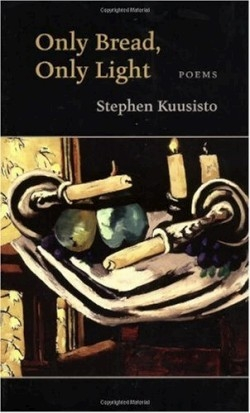Only Bread Only Light
In one of his poems, Kuusisto calls himself a “fool of the night seasons,” referring to the blindness
that affected him during his youth. This poet, however, is no fool about poetry or the construction of beautiful and haunting lines. From the first section of childhood poems in which he appears to be partially sighted, he explores things he will hold dear throughout the poems: light, senses, the love of language, contradiction.
Ironically, it is the imagery he lost to blindness that seems strongest in these early poems. For example, He uses color beautifully, “And I saw light / That took a river’s form- / Light flashing, / Reddish-gold, / Between two banks…” even as he reveals how his blindness affects the poem’s narrative, “Who the hell is this / Turning again to the window, / His finger reaching the sill, / Hands still touching / A river no one can see?” (“Dante’s Paradiso Read Poorly in Braille”).
Sometimes his short line is haiku-esque in imagery and shape, as in the delicate poem, “Facing the Trees”: “We say / Sweet rain / Frees the mushrooms / Our lives / Whirl / Around us / Like Winged seeds.”
The poems are also influenced by places, his childhood home of Finland, and elsewhere, and are strengthened by a specific awareness of history, as in: “In Finland, in Karstula / Ur-village of my father, / They ate salted roots, // Black parsnips, / Cloud-berries, / Worm-wood.” He writes about his seeing-eye dog, about myths and stories-King of the Crickets and Talking Books. His poems refer to muses and allegros, prisms and Breton. Though he calls himself a “fool of the night seasons,”-and indeed there are moments of darkness in these poems-they are filled with light, with careful and startling images, and with a fine appreciation for the senses.
His blindness is simply one facet of his work, to be considered as well as any other aspect of his writing persona. If there is any influence, it is an advantage-all the sensory language is lyrical and equally well-crafted, as though only through his night season could the senses, including the absent one, be equally balanced in these poems.
Reviewed by
Anne-Marie Oomen
Disclosure: This article is not an endorsement, but a review. The publisher of this book provided free copies of the book to have their book reviewed by a professional reviewer. No fee was paid by the publisher for this review. Foreword Reviews only recommends books that we love. Foreword Magazine, Inc. is disclosing this in accordance with the Federal Trade Commission’s 16 CFR, Part 255.

